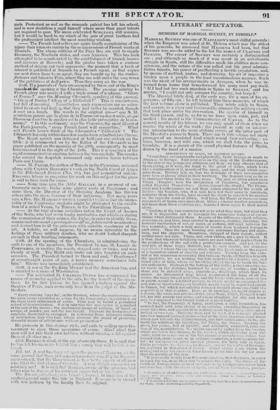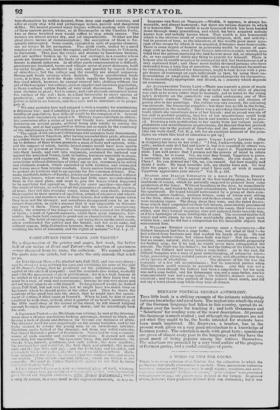LITERARY SPECTATOR.
MEMOIRS OF MARSHAL SUCHET, BY HIMSELF.*
MARSHAL SUCHET VMS one Of NAPOLEON'S 1110st Skilful generals : when the Emperor was asked at St. Helena which was the ablest of his generals, he answered that MASSENA had been, but that SUCHET was so—he added to the list the names of CLAUSEL and GERARD. The career of SUCHET was certainly a distinguished one ; and although so much of it was spent in an unfortunate struggle in Spain, still his difficulties made his abilities more conspieuous, and the nature of the war called out his great administrative talents, his power of pacificating a hostile population, and, by means of method, justice, and dexterity, his art of imposing a burden upon a people in the least incommodious manner. Such was the merit of his arrangements in Arragon, when he was informed from home that henceforward his army must pay itself. " If I.had but two such marshals in Spain as SUCHET," said his master, " I could not only conquer the country, but keep it:' The Marshal lately died, at the early age, for a man of his experience, of fifty-six : he left behind him these memoirs, of which the first volume alone is published. They relate solely to Spain, and narrate in a clear and business-like manner the military events that took place under his observation. He speaks of himself in the third person, and is, as far as we have seen, calm, just, and modest : his model is the Commentaries of C.ESAR. As •, to the general results of his labour, we can only speak of them when we receive the whole of the work : the msent is only an interesting introduction to the more striking events of the latter part of the Marshal's career in Spain. There are in this volume not many passages of an insulated kind which would bear exttnefin2; : we have, however, met with one, which we shall take the pane; to translate. It is a sketch of the grand physital features of Spain, drawn by the hand of a master.
DESCRIPTION OF SPAIN, BY MARSHAL SUCHET. " Considered geographically and physically, Spit belongs as much to Africa as to Europe. Cast yonr eyes on the map of the Mediterranean, by the side of the peninsulas of Greece and Italy : we may observe that of Spain giving, as it were, the hand to the point of Arica, which looks like a continuation of it, in spite of the name, and the strait which sepa.. rates them. History tells us that the destinies of these two countries have been as closely allied as their territory. The Romans went so far as to confound them under the same name. The part of Africa which from Tingis (Tangier) took the designation of Tingitana, was sometimes called Hijuniiz Tramfratana. (Spain-beyond-the-Strait.) The Phamidans and Carthaginians set out from Africa attracted by the wealth of Iketica : the Vandals, who, it is said, have left their name in Andalusia, and after them the Goths, have crossed the strait to establish themselves on the opposite coast of Africa. Still later, the 3loors or Saracens came conquerors of Spain once more from Africa ; whence another revolution, not more than three centuries ago, banished them again to their native shore.
" Looking at the two countries not as to what they were, but what they are, it is impossible not to recognize the numerous features of resemblance which distinguish them. In -spite of the difference Which religion, government, and laws, have created in manners, costume, language, the material similarities of soil, of water, of culture, still exist between the two countries, which a low, series of events have rendered ftyreiom to each other. Thus the samjburning sun consumes Barbary and Andalusia, and the Algarves. Mountains, stripped of their forests, collect neither snow nor rain. Plains, and even vallies, are a prey to thirst. It is true, that wherever fertilizing waters are met with, art applies them to the productions of the soil with a prodigious success. And yet, he the very side of these happy districts, may be seen deserts, the immense de...po!il.i./os t where the eye loses itself, and the heart sinks at the aspect of a boundless extent of sterility and solitude. Viewing from the summit of the numerous mountains that traverse Spain, all that lies beneath the spectator, we see nothing but flats scorched by a flaming sun, and naked sides Of hills, where no breathing object occurs to break the barren uniformity. Perhaps at the bottom of the vallies a river or a streamlet winds in the distance, bordered by marrzins of verdure; and here alone can be detected crops, plantations, dwellings, which track its course. An illuminated map, which represented the form of all the basins, the water tinged with blue, and the banka with green, more or less in extent, would be a faithful picture, in which might be recognized the real state of thisterritory,—a territory nearly equal in superflcial extent to France, but which nevertheless does not support above one-third the population of that country. Here, as in anatomy, we might discern at a glance, the veins and arteries of this great 'body, which, though it wants fat, has still muscle and nerve, and whose structure for size and force may be compared to the timber work of a great building. In fact, the Peninsula of Spain, resting-on a solid foundation, has covered itself with lofty chains of mountains, extending themselves in every direction, and appears to he nothing more than a huge promontory bathed by two seas. Inclining from east to west, it is naturally divided into two unequal inclined plains,—that of the Ebro and some short rivers
which flow towards the Mediterranean, and that which carries to the Atlantic the waters of the Guadiana, the Tagus, the Duero. Leaving the
shore, low plains' full of fertility, and admirably cultivated, form the base of the amphitheatre. We thence ascend by vallies from the hue:this, which are below the streams, to the seerm,c, which are hi;t7her titan the water, until we reach one of the first chains or mountainous ridges. hUt beyond that, there is not, as in ordinary countries, a corresponding ViiiIcy: we are upon the great interior plateau, the table land of Spain. Entire provinces, tli.! Ct.s:..les' La Mancha, and ail the centre of the country, is placed in this elevated region. Other chains again crown the centre, and raise the snow on their frozen peaks into the sky for more than six months of the year.
"It necessarily results from this conformation, that the rivers, in order to reach the sea, make their way hy mining the cart It. The rivers of the :North of Europe arrive at their embouchure by a long course across lakes anti marshes, while the ri-;ers of Spain, Si d all th(.ir tributark.s, prceipi * I‘Mnoires du MarEchal Sucher, Our d'Alburrra, ncs en Espa,,rneA, ::quzis 161S Ibi.; par luAni:hic. Tonic I. Paris, et Londres cLs Culburn. IS2.4 Uniuhabitcd districts are so ronnnun in Spain, ilia they have au especial Dina,: for (hem such a district h called a .lespublode.
tate themselves by sudden descent, from deep and rugged crevices, and offer at every step wild and picturesque scenes, narrow and dangerous defiles. We cannot proceed many leagues without meeting with several of these narrow passes, where, as at Thermopylm or the Caudine Forks, two or three hundred men would suffice to stop whole armies. The ravines are almost always dry, and yet impracticable. Neither are the great rivers means of communication ; the navigation of them is frequently interrupted. Some canals, executed in spite of popular clamour, are no longer fit for navigation. Two great roads, united by a small number of cross roads, leave the capital, and lead to Bayonne, to Valencia, to Barcelona. They pass the rivers and streams by handsome bridges; and are neither broken up by rains nor carriages, in a country where goods are transported on the hacks of mules, and where the use of posthorses is almost unknown. In all other parts communication is difficult, provinces are insulated, towns and villages occur at great distances, built on rocky heights, or sheltered in walls, and guarded by superb forests of olive-trees ; but the cottage and the country are almost unknown. Broom and heath overrun whole districts. These uncultivated lands serve, it is true, to feed the flocks which supply the Spaniard with the fine wool which, however, he cannot convert into clothing without the aid of the foreigner: but culture, such as supplies and increases population, is there confined within limits of very small dimensions. The handol man disdains to plant; fuel is scarce, and coal abounds untouched below the surface of the soil : here, in a land favourable to every species of production, and where a numerous poor demand subsistence, the potato is held in no honour, and they seek not to introduce or to propagate it. "We may perceive how well adapted is such a country for maintaining a defensive war ; and if inhabited by a sober and active, a courageous and intelligent population, how difficult would he the conquest of it. Several nations have successively invaded it. History representsthem as obtaining possession after a series of long and bloody wars, establishing their dominion on several points, without being able wholly to subdue the Spaniards, and at last conoaered or driven out as much by the constancy of the inhabitants as by the ordinary inconstancy of fortune.
"The spirit of the ancieut Celtiberians still animates their descendants, when thc Emperor Napoleon, after having wounded their pride, attempted to subdue them by conquest. 'We know that a people resolved to stand up in defence of their homes presents a mass of force and opinion, without the support of which, hastily-levied armies would have been unable to resist so puissent an invasion. The youth of the country, arms thrust into their hands, and cast into regiments, sustained the national war against the armies of France, both in battles, but more especially in sieges, with vigour and constancy. But the greatest parts of the population, sometimes vvithout distinction of either age or sex, commenced an active mid obstinate contest, which encircled us with enemies, and exhausted our forces more than regular combats. Every canton formed its guerilla, to protect its territory and to co-operate for the common defence. Peasants, landlords, fathers of families, priests and monks, abandoned, without care, their homes, where most of them had little more accommodation than in the open plain, and went to join the forces which happened to be marching fast against us. Ready for every sacrifice—ignorant of the wants of luxury, as well as of all the prejudices of uniform, of services, of arms, they.• fell into irregular corps, chose their own chiefs, followed
their caprice in their manner of operation, attacked whenever and whereever position and numbers were in their favour, fled without shame when
they were not the stronger, and sometimes disappeared even by an ar
ranged dispersion, in such a manner that it was impossible to discover any trace of them. These parties fell into the hands of enterprising chiefs, the remains of the troops of smugglers who covered the frontiers of Spain ; a trait of Spanish manners, which their great romancer, Cervantes, has been bold enough to point out as characteristic of his countrymen. The habit of carrying arms, end using them on the great roads, often confounded the patriot and the bandit, and led us to make, not without reason, little distinction between them when they were found violating the laws of humanity and the rights of nations."—Vol. I. p. 51.



















 Previous page
Previous page